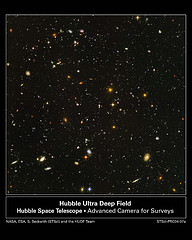Nature of Space
 I attended a lecture on the nature of space today by Sir Michael Atiyah. The lecture is the first in the American Mathematical Society's Einstein Public Lecture Series in Mathematics. This year, marks the 100th anniversary of the rather astounding year in which Albert Einstein published five ground breaking papers that "have shaped the direction of much of science and mathematics for the past century."
I attended a lecture on the nature of space today by Sir Michael Atiyah. The lecture is the first in the American Mathematical Society's Einstein Public Lecture Series in Mathematics. This year, marks the 100th anniversary of the rather astounding year in which Albert Einstein published five ground breaking papers that "have shaped the direction of much of science and mathematics for the past century."
Now, I've been to these sort of lectures at the University before, and found them largely without attendance, so it was to my surprise when my friend Jim and I showed up to a packed house and a great many people being turned away at the door. In addition to a large turnout, apparently a great many students had been given extra credit for attendance. This became more obvious as the less visible portions of the room whipped out notebooks, scratched down about a page or so in said notebooks, awkwardly gazed into space for a few minutes, and then filed out of the auditorium. Still, it was a good crowd.
Abstract: The Nature of Space
For more than two thousand years philosophers, mathematicians and physicists have struggled to understand the nature of space. Kant studied the role of the human mind, mathematicians examined the logical ramifications of space and physicists investigated experimental phenomena. The story continues to the present day, with increasingly exotic scenarios of vibrating strings in ten dimensional space-time. I shall review the history and present status of the great philosophical controversies in the light of modern developments.
During the first half of his presentation, Atiyah traversed through the landscape of early philosophers, posed questions on the nature of reality and perception, and identified various past conceptions of the universe (including platonic solids, or as he calls them "Scottish Solids" and the like). He discussed whether various human accomplishments were inventions or discoveries. For instance, are complex numbers a human invention?.. Many assumed so, but now that they are an integral component of Quantum Mechanics, perhaps we merely discovered something that was already there? This concept raises new issues as even the most basic representation of String Theory requires a truckload of advanced mathematics soup. Anyhow, He discussed the relationship of mathematics to theoretical physics and made a number of witty asides to engage the audience. The second part focused on the relationship between Einstein's work, Quantum Mechanics and String Theory.
The single pervading message that I took away from this event was:
Question your assumptions. Question them in the most fundamentalof ways -- as Einstein did with space and time.
Specifically, Atiyah suggested that String Theory may have (or perhaps for the purposes of elegance ought to have) a simpler underlying representation. All classical theories and even quantum mechanics suggest that if you know the present state (position and velocities of particles) you can predict the future. (Never mind that quantum mechanical uncertainty forbids you from knowing both -- simply if you did know them, you could predict).
Atiyah suggested that perhaps we need to resign that notion, and assumede facto that we must know both the present and the past to know the future. Rather than simply affecting the present through differential equations, one would use retarded differential equations or related methods to actively engage the past. He asserted this as only his personal guess as to where we (the next generation) should look to question ourselves.
In all, though I didn't feel it earth shattering, I would highly recommend listening to Atiyah any time you get the chance. He is an excellent and accessible speaker, and a brilliant and well-regarded man.
 Friday, October 21, 2005 at 07:14AM
Friday, October 21, 2005 at 07:14AM 
Reader Comments